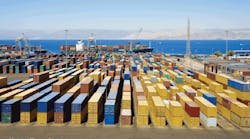Attacks on global supply chains by terrorist groups have hit the highest rate ever as have associated costs, according to a report recently released by BSI.
The variety of attacks include targeting the oil infrastructure, hijacking and cargo theft through to contraband smuggling, extortion and kidnapping schemes.
Over the past 10 years, an average of 3.1 attacks have occurred each week. In 2016 a total of 346 attacks took place, according to analysis conducted by BSI’s SCREEN Intelligence program.
The report also found that in 2016 terrorists targeted a wider range of industries and modes of transport than in any other year. In particular, terrorists increasingly targeted industries generally associated with private or corporate supply chains rather than state-owned supply chain infrastructure. Over three years of data, terrorist attacks against the agriculture and food and beverage sectors more than tripled, attacks on the industrial and manufacturing materials and pharmaceuticals sectors more than doubled, and attacks against the metals industry nearly doubled.
While attacks have occurred in 58 countries, the report found that there are particular routes and countries that have been hit worse by these kinds of attacks. Supply chain terror attacks occur at higher rates include Colombia, India, and Turkey.
“It is a common misconception that terrorism is strictly a national security issue and that counterterrorism is solely the responsibility of governments,” said Jim Yarbrough – Global Intelligence Program Manager at BSI.
“However, our analysis clearly shows that commercial interests and private organizations are increasingly threatened, extorted, and directly targeted by terrorist organizations all over the world. Corporations must take notice and prepare their organizations accordingly. We know that industry leaders are implementing stronger supply chain security measures and ensuring that their business partners and international suppliers are fully vetted and armed with the information and knowledge that will protect their business. They understand that these measures can go a long way in maintaining their global operations and business continuity.”
Financial Effects
Costs to the supply chain as a result of attacks are both direct and indirect. Physical attacks against the supply chain, such as arsons, bombings, or armed assaults create direct disruption and often result in the destruction or loss of transported cargo.
Additionally, attempts to tamper with international cargo shipments can compromise the integrity of the load or result in the seizure or destruction of goods by customs authorities. When companies have to unexpectedly divert or reroute shipments the costs can reach massive figures. For example, the terrorism related to the Syrian conflict forced Lebanese officials to reroute $1 billion worth of exports and resulted in the loss of $754 million in revenue for the Jordanian trucking industry.
BSI’s analysis indicates that terrorism also imposes significant indirect costs on international trade and supply chains. Increased security measures, while intended to mitigate the risk of additional attacks, have disrupted the typical flow of cargo, especially for cross-border shipments. These additional procedures have often slowed the movement of freight and increased shipping costs, and companies have frequently responded by rerouting cargo or modifying shipping arrangements, further driving up costs.
For example, following the Paris attack in November 2015 France imposed stricter controls along the borders with Belgium and Luxembourg, costing companies an additional $59 per delayed vehicle. The total cost to shippers in Belgium was estimated at $3.5 million within the first month following the attack.
Worryingly, despite the upward trend of attacks, BSI’s report found that there is still inadequate spending on supply chain security. For example, in India, cargo throughput has increased sharply over the past decade, with air freight volume alone increasing by nearly 120%. However, this growth in shipping volume has not been met with a matching investment in supply chain security. Similar concerns in Bangladesh have led the European Union to recently prohibit the direct importation of air freight from Bangladeshi airports.



